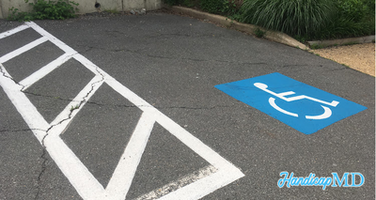
Unveiling the Rules and Regulations of Using a Disability Tag in Kansas
Disability tags, also known as handicap parking permits, play a critical role in ensuring accessibility for individuals with physical impairments. These passes provide enhanced access to parking spaces near building entrances, making it easier for people with mobility limitations to navigate public and private spaces. KS, like many other states, has specific rules and regulations governing the use of these passes to prevent abuse and to protect the rights of individuals with disabilities.
In this article, we’ll explore the eligibility requirements, the application process, rules for the use of disability tags in KS, and the penalties for misuse. Furthermore, we will examine how law enforcement monitors and enforces these regulations and provide resources for reporting abuse. Finally, we will answer frequently asked questions to clarify common concerns about the use of disability tags.
Introduction to Handicap Placards in Kansas
Importance of Disability Tags
Disability parking tags ensure that individuals with mobility impairments have better access to essential services and daily activities. Without these accommodations, individuals with disabilities would face significant challenges accessing public spaces, leading to decreased independence and limited participation in society.
The Americans with Disabilities Act (ADA) mandates that businesses and public institutions provide accessible parking, but it is up to individual states to regulate how disability tags are issued and used. KS, like all other states, has implemented its own set of rules governing the issuance and proper use of these tags to protect the rights of individuals with disabilities.
Overview of Disability Parking Regulations in Kansas
In KS, the use of disability tags is regulated by the Kansas Department of Revenue, Division of Vehicles. The state offers both permanent and temporary tags to individuals with certified medical conditions that limit their mobility. Parking spaces designated for disability tag holders are located near building entrances and feature larger dimensions to accommodate wheelchair ramps and other assistive devices.
However, as with any system, the misuse of disability tags—whether through fraudulent acquisition or improper use—can undermine the accessibility needs of individuals who genuinely rely on these accommodations. This is why KS has established stringent guidelines for the issuance, use, and enforcement of disability tags.
Eligibility Requirements for Handicap Placards in Kansas
Who Qualifies for a Disability Parking Permit in KS?
To qualify for a Kansas disabled permit, individuals must meet specific criteria related to their physical limitations. The state requires that applicants have a condition that severely limits their ability to walk, such as needing the use of a wheelchair, walker, crutches, or other mobility aid.
Applicants must also provide medical documentation that confirms their condition, typically through a signed certification from a licensed physician or healthcare provider. The physician must attest that the applicant has a permanent or temporary physical impairment that significantly impacts their ability to walk or perform daily activities.
Conditions That Make One Eligible for a Tag
KS law provides a comprehensive list of conditions that make an individual eligible for a disability tag, including:
- Severe lung disease: Individuals with respiratory conditions that limit their physical activity.
- Heart conditions: Those with severe cardiovascular diseases that impair their ability to move.
- Neurological disorders: Conditions like multiple sclerosis, Parkinson's disease, or cerebral palsy.
- Mobility impairments: Individuals who are unable to walk 200 feet without stopping to rest.
- Amputation: Individuals who have lost the use of one or more limbs.
- Other severe medical conditions: As certified by a licensed physician.
Types of Disability Tags Available
KS offers several types of handicap permits:
- Permanent Disability Placards: For individuals with lifelong conditions, these placards are renewable every five years.
- Temporary Disability Placards: Issued for short-term disabilities (e.g., recovery from surgery or injury), these tags are valid for up to six months.
- Disability License Plates: These plates are available for vehicles owned by individuals with permanent disabilities and provide the same parking privileges as placards.
How to Apply for a Disabled Parking Permit in Kansas
The Application Process Explained
The application process for obtaining a disability tag in KS is straightforward. Individuals must complete Form TR-159, which is available from the KS Department of Revenue’s website. The form requires basic personal information as well as a certification from a licensed healthcare provider verifying the nature of the applicant’s disability.
Once the application is completed and signed by a physician, it can be submitted by mail or in person to any Kansas County Treasurer’s office. Processing times vary, but most tags are issued within a few weeks of submitting a completed application.
Medical Certification Requirements
KS law requires that individuals seeking a disability tag provide certification from a licensed medical professional, such as a physician, osteopath, chiropractor, or optometrist, depending on the nature of the disability. The healthcare provider must confirm that the applicant meets the state's criteria for limited mobility or other qualifying conditions.
Medical professionals may also certify whether the condition is permanent or temporary, which determines whether the individual receives a permanent or temporary tag.
Temporary vs. Permanent Tags
Temporary disability tags in KS are typically valid for six months or less, depending on the applicant's recovery timeline. After the expiration date, individuals must reapply if they need continued use of the tag.
Permanent tags, on the other hand, are valid for five years and must be renewed through a similar process, though applicants are not required to submit a new medical certification unless requested by the state.
How to Properly Use a Handicap Placard in Kansas
Displaying the Tag Correctly
In KS, handicap placards must be prominently displayed on the vehicle’s rearview mirror when the vehicle is parked in a designated disabled parking space. The tag should be clearly visible from the outside of the vehicle to ensure that law enforcement or parking enforcement officers can verify the validity of the permit.
For individuals using disability license plates, the plate itself serves as proof of eligibility, so no additional placard is necessary.
When and Where the Tag Can Be Used
Disability parking tags in KS are valid in any accessible parking space designated for individuals with disabilities. This includes public parking lots, private business parking areas, and government buildings.
It’s important to note that these tags are only valid when the person with the disability is either driving or being transported in the vehicle. Using the tag when the individual with the disability is not present constitutes a violation of KS law.
Restrictions on the Use of Disability Parking Spaces
Disability tags are intended solely for the use of individuals with physical impairments. Parking in these spaces without a valid pass, using someone else’s pass, or parking in such a space when the authorized holder is not present are all violations of KS law and can result in penalties, including fines and possible suspension of the pass.
Misuse of Disability Tags and Its Consequences
Common Forms of Disability Tag Misuse
Disability tag misuse occurs in a variety of ways, including:
- Using someone else’s disability tag: One of the most common forms of abuse involves using a tag issued to a family member or friend who is not present.
- Parking in accessible spaces without a tag: Some individuals park in designated disability spaces without displaying a valid tag.
- Using expired or fraudulent permits: Expired passes are sometimes left in vehicles to deceive parking enforcement, while others may create or use fraudulent tags.
Penalties for Violating Disability Parking Laws
KS has strict penalties in place to deter the misuse of disability passes. Violators may face:
- Fines: Parking illegally in an accessible space or using a pass improperly can result in fines ranging from $50 to $500, depending on the severity of the violation.
- Tow or impoundment: Vehicles found parked in accessible spaces without proper authorization may be towed or impounded at the owner’s expense.
- Revocation of permit: Repeat offenders may have their disability passes revoked.
How the State of Kansas Enforces Disability Tag Regulations
KS law enforcement agencies and parking enforcement officers are responsible for enforcing disability tag regulations. Officers regularly patrol parking lots, especially in high-traffic areas, to ensure that only individuals with valid passes are using designated accessible spaces. Technology, such as automated license plate readers (ALPR), is also being used in some areas to help monitor parking compliance.
Reporting Handicap Placard Abuse in Kansas
How to Report Suspected Abuse
If you suspect that someone is misusing a disability tag in KS, you can report it to local law enforcement or parking enforcement agencies. Some jurisdictions also offer hotlines or online reporting systems where members of the public can submit reports of abuse anonymously.
When reporting suspected abuse, it’s helpful to provide as much detail as possible, including the vehicle’s license plate number, location, and a description of the incident.
What Happens After You File a Report
Once a report of suspected disability tag misuse is filed, local authorities may investigate the claim by reviewing surveillance footage, speaking with witnesses, and verifying the validity of the disability tag. If the individual is found to be in violation of KS law, they may face fines, vehicle impoundment, or even criminal charges in cases of fraud.
Importance of Public Awareness in Preventing Abuse
Public awareness campaigns play a crucial role in preventing the misuse of disability tags. KS organizations, along with local advocacy groups, often run educational campaigns to inform the public about the importance of preserving accessible parking spaces for individuals with genuine needs.
Accessible Parking Spaces: Regulations for Businesses and Public Facilities
What Businesses Must Do to Comply with the ADA
The Americans with Disabilities Act (ADA) mandates that businesses provide accessible parking spaces for individuals with disabilities. KS law mirrors these federal requirements, ensuring that public and private establishments comply with accessibility standards.
Accessible Parking Space Requirements in Kansas
The ADA outlines specific guidelines for the number and size of accessible parking spaces required based on the size of a parking lot. KS enforces these guidelines, ensuring that businesses provide adequate parking for individuals with disabilities. Accessible spaces must include proper signage, sufficient width to accommodate mobility devices like wheelchairs, and access to a safe, accessible route into the building.
Responsibility of Property Owners in Enforcing Disability Parking Laws
Business owners and property managers in KS are responsible for maintaining compliance with disability parking regulations. This includes ensuring that accessible spaces are clearly marked, regularly monitored, and kept free of obstacles that may block access. They also have the authority to report violations and collaborate with local law enforcement to enforce parking rules.
The Role of Law Enforcement in Disability Tag Regulation
How Law Enforcement Monitors Parking Spaces
Law enforcement agencies in KS actively monitor public parking areas for violations of disability parking laws. Officers may issue citations or warnings to violators and can initiate towing for vehicles parked in accessible spaces without authorization.
Police Investigation of Disability Tag Misuse
In cases where fraudulent or repeated misuse of disability tags is suspected, KS police departments can open investigations to gather evidence. This may involve reviewing the authorized holder’s medical records, interviewing witnesses, and coordinating with state agencies to verify the validity of the disability tag.
Legal Protections for People with Disabilities in Kansas
Federal vs. State Laws on Disability Rights
The federal government, through the Americans with Disabilities Act (ADA), sets minimum standards for protecting the rights of individuals with disabilities, including access to parking. KS state law aligns with these federal protections, ensuring that individuals with disabilities have access to public accommodations and equal rights under the law.
How Kansas Protects People with Disabilities
KS offers several legal protections to ensure that people with disabilities can access public spaces and services. In addition to disability parking regulations, the state has laws that prohibit discrimination against individuals with disabilities in employment, housing, and education.
Legal Recourse for People with Disabilities Facing Discrimination
Individuals with disabilities who experience discrimination or barriers to accessibility can file complaints with the KS Human Rights Commission (KHRC) or the U.S. Department of Justice. Legal recourse may include monetary damages, orders for improved accessibility, or changes to discriminatory practices.
Technology and Innovations in Disability Parking
How Digital Systems Are Improving Disability Parking Enforcement
In recent years, KS has begun exploring new technologies to improve disability parking enforcement. Digital systems, such as automated license plate readers (ALPR) and mobile applications, are being used to monitor parking spaces and ensure compliance with state laws.
Use of Smart Tags and Mobile Applications for Tag Holders
Some states have introduced smart disability tags equipped with QR codes or RFID technology, allowing for easier tracking and verification of disability passes. Mobile applications can also be used to help disability tag holders find available accessible parking spots in real-time.
Surveillance and Monitoring Tools to Curb Abuse
Surveillance cameras and automated monitoring systems are becoming increasingly common in public parking lots across KS. These tools help law enforcement and property owners quickly identify violations and take appropriate action against those misusing disability tags.
The Role of Advocacy Groups in Protecting Disability Rights
Disability Rights Organizations in KS
Several advocacy groups in KS work to protect the rights of individuals with disabilities, including Disability Rights Kansas (DRK) and the Kansas Association for Independent Living (KAIL). These organizations provide resources, legal assistance, and public awareness campaigns to ensure that individuals with disabilities have equal access to public services and accommodations.
How Advocacy Groups Help Enforce Parking Regulations
Advocacy groups play a vital role in helping enforce disability parking regulations by educating the public, assisting individuals in applying for disability tags, and working with law enforcement to prevent the misuse of disability tags.
Educational Programs to Raise Awareness
Many KS-based advocacy organizations offer educational programs to raise awareness about the importance of accessible parking and the legal consequences of disability tag abuse. These programs target schools, businesses, and government institutions to foster a greater understanding of the challenges faced by individuals with disabilities.
The Future of Disability Parking Regulations
How Kansas Is Adapting to Changes in Disability Rights
As technology advances and public awareness of disability rights grows, KS is likely to see changes in its disability parking regulations. The state has already begun adopting digital tools to improve enforcement, and further reforms may be on the horizon to address challenges such as fraud prevention and increasing the availability of accessible parking.
Trends in Disability Parking and Potential Regulatory Changes
Looking ahead, we can expect to see more states, including KS, move toward digital systems for managing disability tags. Smart permits, real-time tracking of accessible parking spaces, and better integration of data between healthcare providers and state agencies may be key trends in the future of disability parking enforcement.
Frequently Asked Questions
Who qualifies for a disability passes in KS?
Individuals with a certified medical condition that severely limits their ability to walk, including those with respiratory diseases, heart conditions, neurological disorders, and mobility impairments, may qualify for a disability pass in KS.
Can I use my KS disability tag in other states?
Yes, KS-issued disability tags are recognized in other states that comply with the Americans with Disabilities Act (ADA). However, it’s always a good idea to check local regulations when traveling to ensure compliance.
What is the penalty for using someone else’s disability tag?
Using someone else’s disability parking tag in KS can result in fines ranging from $50 to $500, depending on the severity of the offense. Repeat violations may lead to the revocation of the tag.
How do I report someone misusing a disability parking space?
You can report suspected misuse of a disability parking permit to local law enforcement or parking enforcement officers. Some cities in KS also offer anonymous reporting systems online or via hotlines.
Are there differences between temporary and permanent disability tags?
Yes, temporary disability tags in KS are issued for short-term conditions, such as recovery from surgery or injury, and are valid for up to six months. Permanent tags are for individuals with long-term or permanent disabilities and are renewable every five years.
How can businesses ensure compliance with disability parking regulations?
Businesses can ensure compliance by clearly marking accessible parking spaces, maintaining adequate signage, and monitoring parking areas to prevent unauthorized use of disability parking spaces. Collaborating with local law enforcement and parking enforcement officers can also help in preventing misuse.
Conclusion
Disability tags are essential tools that allow individuals with physical impairments to access public spaces with ease. In KS, the state has implemented a comprehensive system to regulate the issuance and use of these tags, ensuring that they are reserved for those who genuinely need them. By following the rules and guidelines established by the KS Department of Revenue and working together to report misuse, we can help preserve the integrity of accessible parking and protect the rights of people with disabilities.
As KS continues to adapt to changes in disability rights and adopt new technologies, the future of disability parking enforcement looks promising. However, the success of these regulations ultimately depends on public awareness and a shared commitment to ensuring that all individuals, regardless of their physical abilities, have equal access to public and private spaces.
.png)






